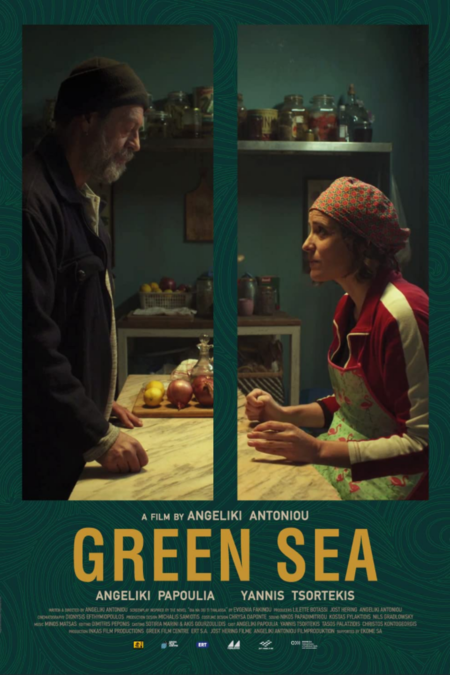Identity is a powerful thing and it sits, or rather the lack of it sits, at the heart of Angeliki Antoniou’s Green Sea, a movingly understated film that explores what it is like to forge a new life when you are not even sure who you are.
Anna (Angeliki Papoulia) is first introduced to us wandering through the streets of an unnamed Greek city, dressed in an ill-fitting winter coat and beanie, a distressingly unsure look in her eyes as if she has no idea where to head next, or what she will do, or needs to do when she gets there.
That vacant expression reflects an inner emptiness with Anna unable to remember who she is, what she does or where she belongs.
Buying some food at a store – thankfully the one thing she does remember is how to cook, a latent skill that is all that remains of the mysterious person she once was – she is handed a job notice for a taverna looking for a cook and with nowhere else to go, she sets out to apply for the job which she instinctually hopes will give her some sense of purpose and identity.
This is all surmised, of course, because Anna is discomfortingly silent, something the taverna’s emotionally changeable owner, Roula (Yannis Tsortekis) discovers when he interviews her and discovers she has nowhere to live and needs not only the job but the free room and board that comes with it.
While Anna may not say much, if anything at all, it soon becomes evident that she can cook and cook brilliantly well, and soon the out-of-the-way tavernas small but regular clientele, mainly made up of truck drivers and construction workers decide that Anna is the best thing that has happened to them, Roula and the unloved taverna set on a desolate piece of oceanfront.
What follows is a slow but steady coming together of lost souls including nursing home escapee Kyriakos (Tasos Palatzidis) whose only desire is to paint again, something his former lodgings denied him and which give him a quiet joy that he brings to a friendship with Anna who is desperately in need of meaningful connection but unlikely to find it with Roula, who though sporadically kind, runs hot and cold in his affections, mired in the grief of losing both hos boyfriend and a promising musical career many years earlier.
If you’re looking for some sort of Disneyfied saviour film where connection and found family sets everything right, then Green Sea is likely not for you; however, if you’re after a film that gets to the heart of identity and belonging by being brutally honest about what its lack does to you and how hard it can be to fix that even when the people you need are right in front of you, then you will a rich and rewarding story that is groundedly and affectingly human in the most marvellously understated of ways.
The brilliance of Green Sea is that it doesn’t seek to wave any kind of magic wand over the lives of Anna, Roula and Kyriakos.
Yes, their lives do get better and richer for knowing each other, although Anna understandably remains deeply troubled by her amnesia and the identity it has stolen from her, but they are not magically transformed; instead they find small moments of togetherness that make up for the pervasive isolation and alienation of their lives.
These scattered moments of connectivity exist though in a one step forward, eight steps back world where Roula remains lost in bitterness about past wrongs and losses, and Anna is subsumed by a strong sense that she has lost who she intrinsically is forever.
There’s no doubt that either she or Roula have been changed by knowing each other and there is a profoundly palpable connection between them that percolates through even to the simultaneously ambiguous and resolved final act which suggests the story is not over for them yet.
In fact, it appears that Anna may have been changed in ways even she doesn’t realise until the final arrestingly stark and emotionally resonant scene of a film that says a great deal in the quietest and most nuanced of ways.
She may be a quiet character who expresses herself almost uniformly in short, thoughtful sentences and brief moments of connection with fractured memory shards but there is a great deal going on beneath the surface, much of which finds expression in subtle ways through the superlative performance of Papoulia.
She is able to convey, sometimes in a glance or the raising of an eyebrow that someone has hurt her or that she is frightened or overwhelmed, and it’s these small but pivotally important actions that convey so much and give Green Sea such a quietly thoughtful and deeply meaningful feel.
Consequently the film is one of those sublimely wonderful, slice-of-life character dramas that doesn’t ever overplay its hand, that never once milks its resonant narrative for cheap emotional reactions and is all too aware that while good things can happen to people in the worst times of their lives, that happy endings, or at least the obvious version many of crave, are not a given.
Yes, the central characters find a nourishing, if inconsistently realised, source of connection with each other and a roughly hewn found family that comes to includes the diners themselves, and it is a pleasure to watch this happen but Antoniou is savvy enough to know, and talented enough to communicate in real and grounded ways, that this is the end of the story by any measure.
Green Sea is one of those immensely satisfying films that takes life on its own terms, being honest about the often attendant bleakness but also about the hope found within it, and lets it characters find a way to an imperfect resolution which may yet find a way to change their lives in an ongoing way for the better.
